The bishops of Europe studied the question of restitution of Church’s property
Tuesday, 06 October 2009, 20:00 From October 1 to 4, 2009, an annual plenary meeting of the Council of Episcopal Conferences of Europe (Consilium Conferentiarum Episcoporum Europae (CCEE)) was held in France, in which the heads and official representatives of the 34 national Episcopal conferences of Europe took part. From the Synod of Bishops of the UGCC, as the representative of His Beatitude Lubomyr, in the work of the CCEE participated Bishop Bohdan (Dzyurakh), secretary of the Synod of Bishops of the UGCC, head of the Patriarch’s administration. Participants of the CCEE also were the representatives of the Holy See and guests from other continents, who were in a position to communicate with their European colleagues.
From October 1 to 4, 2009, an annual plenary meeting of the Council of Episcopal Conferences of Europe (Consilium Conferentiarum Episcoporum Europae (CCEE)) was held in France, in which the heads and official representatives of the 34 national Episcopal conferences of Europe took part. From the Synod of Bishops of the UGCC, as the representative of His Beatitude Lubomyr, in the work of the CCEE participated Bishop Bohdan (Dzyurakh), secretary of the Synod of Bishops of the UGCC, head of the Patriarch’s administration. Participants of the CCEE also were the representatives of the Holy See and guests from other continents, who were in a position to communicate with their European colleagues.
 From October 1 to 4, 2009, an annual plenary meeting of the Council of Episcopal Conferences of Europe (Consilium Conferentiarum Episcoporum Europae (CCEE)) was held in France, in which the heads and official representatives of the 34 national Episcopal conferences of Europe took part. From the Synod of Bishops of the UGCC, as the representative of His Beatitude Lubomyr, in the work of the CCEE participated Bishop Bohdan (Dzyurakh), secretary of the Synod of Bishops of the UGCC, head of the Patriarch’s administration. Participants of the CCEE also were the representatives of the Holy See and guests from other continents, who were in a position to communicate with their European colleagues.
he theme of this year’s meeting is “Relations of the church and state.” In a preamble to the plenary meeting, the president of CCEE cardinal Peter Erdio presented the purpose of the meeting: “Executing the pastoral task for God’s people, the bishops realize a necessity to be familiar with the decisions and work on the relations with the church of every European state. We also will consider the questions which remain unresolved, in particular, the confiscation of church property during communism... Presently there exist many various models which regulate these relations. However, that which was good for Poland, would be destructive for Turkey. There cannot be only one model.”
The participants of the meeting discussed the relations of the church and state in the context of the recent visit of Pope Benedict XVI to the Czech Republic and the Year of Priesthood, which began in the Catholic Church. The bishops of Europe placed their attention also on the theme
From October 1 to 4, 2009, an annual plenary meeting of the Council of Episcopal Conferences of Europe (Consilium Conferentiarum Episcoporum Europae (CCEE)) was held in France, in which the heads and official representatives of the 34 national Episcopal conferences of Europe took part. From the Synod of Bishops of the UGCC, as the representative of His Beatitude Lubomyr, in the work of the CCEE participated Bishop Bohdan (Dzyurakh), secretary of the Synod of Bishops of the UGCC, head of the Patriarch’s administration. Participants of the CCEE also were the representatives of the Holy See and guests from other continents, who were in a position to communicate with their European colleagues.
he theme of this year’s meeting is “Relations of the church and state.” In a preamble to the plenary meeting, the president of CCEE cardinal Peter Erdio presented the purpose of the meeting: “Executing the pastoral task for God’s people, the bishops realize a necessity to be familiar with the decisions and work on the relations with the church of every European state. We also will consider the questions which remain unresolved, in particular, the confiscation of church property during communism... Presently there exist many various models which regulate these relations. However, that which was good for Poland, would be destructive for Turkey. There cannot be only one model.”
The participants of the meeting discussed the relations of the church and state in the context of the recent visit of Pope Benedict XVI to the Czech Republic and the Year of Priesthood, which began in the Catholic Church. The bishops of Europe placed their attention also on the theme “The church and the media,” in particular, on one hand, how church life is covered in secular media, and on the other hand, how the church should cooperate with the media world for the spread of the Gospel, and also how to use modern technology more effectively inside the church for evangelistic and pastoral activity. Furthermore, according to Bishop Bohdan, during the plenary meetings important themes of migration, catechization, ecology, Catholic schools, and ministering in the higher educational institutions were examined for the European continent in general and in particular for the church in Europe. Also, the coverage of gender problems in the European legislation was discussed, and current questions in the industry of bioethics were studied. Background information In Europe there are 34 national Catholic Episcopal conferences, which create one all-European organ – the Council of Episcopal Conferences of Europe, which from 2006 is headed by the president of the CCEE cardinal Peter Erdio. Plenary assemblies enable communication between the separate Episcopal conferences and to produce a compatible position toward the different challenges of the modern age. For the UGCC, such meetings are especially important because it allows the church to enter Europe and by this, in particular, Ukraine is perceived as a European state.
Information Department of the UGCC
Photo: www.eglise.catholique.fr
LATEST NEWS

We can imagine what the prayer of the prisoners in the Russian torture centers in the Ukrainian Kharkiv region was like – Head of the UGCC on the 206th day of the war 17 September
A vast cemetery, a mass burial, was found near the city of Izyum, in which more than 400 innocently killed and tortured people have already been...
-
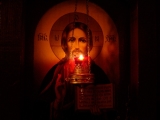 Глава УГКЦ у 158-й день війни: «Нехай Господь прийме з уст нашої Церкви псалми та моління за всіх тих, які особливо просять нашої молитви»
Глава УГКЦ у 158-й день війни: «Нехай Господь прийме з уст нашої Церкви псалми та моління за всіх тих, які особливо просять нашої молитви»
-
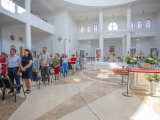 «Сила, яка походить із вірності Христові, є стержнем, який ніхто не може зламати», – Блаженніший Святослав
«Сила, яка походить із вірності Христові, є стержнем, який ніхто не може зламати», – Блаженніший Святослав
-
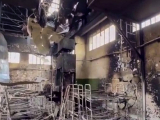 Глава УГКЦ у 157-й день війни: «В ім’я Боже ми засуджуємо звірства в Оленівці і світ повинен це засудити як особливий вияв дикості й жорстокості»
Глава УГКЦ у 157-й день війни: «В ім’я Боже ми засуджуємо звірства в Оленівці і світ повинен це засудити як особливий вияв дикості й жорстокості»
-
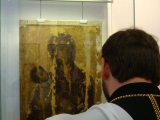 «Боже, почуй наш плач і поспіши нам на допомогу і порятунок!», – Глава УГКЦ у 156-й день війни
«Боже, почуй наш плач і поспіши нам на допомогу і порятунок!», – Глава УГКЦ у 156-й день війни
-
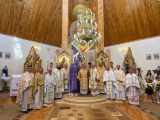 «Бог йому дав серце і душу українського народу»: відбулася щорічна проща до Прилбичів з нагоди уродин митрополита Андрея Шептицького
«Бог йому дав серце і душу українського народу»: відбулася щорічна проща до Прилбичів з нагоди уродин митрополита Андрея Шептицького
-
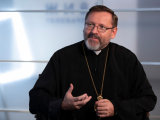 Глава УГКЦ: «Я горджуся українськими патріотами, які без найменшої краплі ненависті готові захищати своє»
Глава УГКЦ: «Я горджуся українськими патріотами, які без найменшої краплі ненависті готові захищати своє»
-
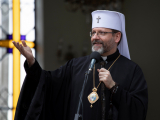 Блаженніший Святослав закликав українську молодь скласти присягу на вірність Христові
Блаженніший Святослав закликав українську молодь скласти присягу на вірність Христові
-
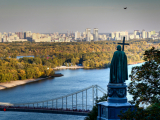 Глава УГКЦ у 155-й день війни: «Помолімося, щоб не втратити скарбу віри князя Володимира»
Глава УГКЦ у 155-й день війни: «Помолімося, щоб не втратити скарбу віри князя Володимира»
-
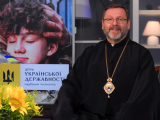 Блаженніший Святослав у День державності України: «Наша Держава – це для нас питання життя або смерті»
Блаженніший Святослав у День державності України: «Наша Держава – це для нас питання життя або смерті»
-
 Глава УГКЦ у 154-й день війни: «Нехай Господь Бог прийме у свої вічні обійми журналістів, які віддали за правду своє життя в Україні»
Глава УГКЦ у 154-й день війни: «Нехай Господь Бог прийме у свої вічні обійми журналістів, які віддали за правду своє життя в Україні»
-
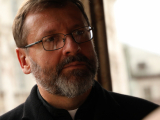 Глава УГКЦ у 153-й день війни: «Принесімо наш біль перед Боже обличчя і будьмо певні, що Він нас вислухає»
Глава УГКЦ у 153-й день війни: «Принесімо наш біль перед Боже обличчя і будьмо певні, що Він нас вислухає»
-
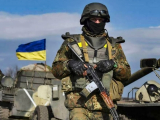 Глава УГКЦ у 152-й день війни: «Помолімся молитву заступництва за наших воїнів»
Глава УГКЦ у 152-й день війни: «Помолімся молитву заступництва за наших воїнів»
-
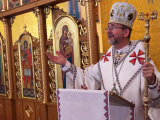 «Віруюча людина не може бути байдужою, коли бачить страждання іншої людини», – владика Богдан Дзюрах
«Віруюча людина не може бути байдужою, коли бачить страждання іншої людини», – владика Богдан Дзюрах
-
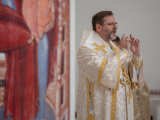 «Серед нашого страждання творімо простір для прояву Божої всемогутності», – Глава УГКЦ у 6-ту неділю після П’ятдесятниці
«Серед нашого страждання творімо простір для прояву Божої всемогутності», – Глава УГКЦ у 6-ту неділю після П’ятдесятниці
-
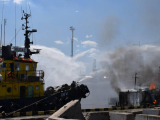 Глава УГКЦ у 151-й день війни: «Російське віроломство ми перемагаємо силою любові до нашої Батьківщини»
Глава УГКЦ у 151-й день війни: «Російське віроломство ми перемагаємо силою любові до нашої Батьківщини»

